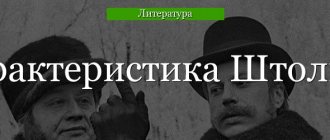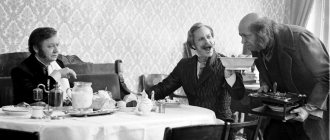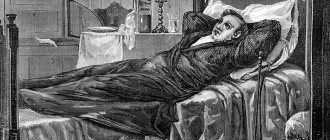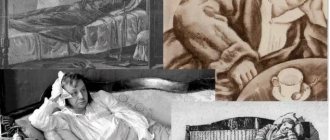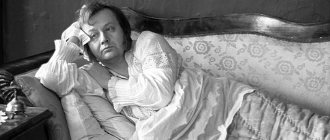The first part of Goncharov’s large-scale novel describes the dream of Ilya Ilyich, the main character of Oblomov. This episode of the work of the great author is a description of the true image of the hero’s personality, and serves as a starting point for understanding the meaning of the novel. The characterization of the hero creates a general portrait of Oblomovism, a phenomenon that has absorbed the worst vices of Russian society, and allows us to regard the genre of the novel as a social work. The confrontation of the heroes highlights the differences between conflicting worldviews, and reveals the essence of each character.
Ilya Ilyich Oblomov
The central image of the book is the young (32-33 years old) landowner Ilya Ilyich Oblomov, a lazy, imposing dreamer. He is a man of average height, with dark gray eyes, pleasant facial features, and childishly pampered plump hands. Oblomov lives in a St. Petersburg apartment on the Vyborg side. The characteristics of this person are ambiguous. Oblomov is an excellent conversationalist. By his nature, he is not capable of causing harm to anyone. His soul is pure. He is educated and has a broad outlook. At any given time, his face reflects a continuous stream of thoughts. It would seem that we are talking about a successful person, if not for the enormous laziness that has taken possession of Ilya Ilyich. Since childhood, numerous nannies took care of him in small ways. “Zakharki da Vanya” from the serfs did any work for him, even small ones. His days pass in idleness and lying on the sofa.
He is naive to such an extent that in the end he finds himself deceived and ruined by swindlers: Mikhei Tarantiev and Ivan Matveevich Mukhoyarov.
Trusting them, Oblomov signed an enslaving agreement for his Vyborg apartment, and then paid fake “moral damages” to Agafya’s brother Mukhoyarov in the amount of ten thousand rubles through a fake loan letter. Ilya Ilyich's friend Stolz exposes the scoundrels. After this, Tarantiev “goes on the run.”
Oblomov falls in love with a young noblewoman, Olga Ilyinskaya, but their romance ends in a break. Later Oblomov marries the hardworking poor widow Agafya Pshenitsyna.
Those around him feel that he is a sincere person, Oblomov. The characterization is a characterization, but the protagonist’s self-destruction through laziness does not prevent him from having friends. The reader sees how a true friend Andrei Stolts is trying to snatch Oblomov from the tight embrace of doing nothing. After Oblomov’s death, he became, according to the latter’s will, an adoptive father for his son Andryusha.
I. A. Goncharov shows that people like Oblomov have no future, they are doomed to a tragic fate. That is why when the main character of a work dies, the story still continues.
Main characters
Ilya Ilyich Oblomov
In “Oblomov” the characters are opposed to each other, Ilya Ilyich is the antipode of Stolz. Sybarite, lives off what others have earned. In the novel, there is a deep analysis of a decaying personality, leading to its degradation. He has outdated views that deny the future. A completely weak-willed person, extremely lazy. He loved Olga, but differences in views led to conflict. Relations with Ilyinskaya came to a breakdown, and he married the widow Agafya Pshenitsyna. Detailed characteristics of Oblomov.
Andrey Ivanovich Stolts
The complete opposite of Oblomov, he confidently looks forward. Ephemeral fantasies are alien to him; he achieves his goals with pleasure and works hard. Like Oblomov, he has not only positive qualities, but also disadvantages. He has been friends with Ilya Ilyich since childhood, helps him in all matters. Respects his kindness and kindness. Detailed characteristics of Stolz.
Olga Sergeevna Ilinskaya
The list of her positive qualities primarily includes emotionality and strong beliefs. She is a progressive, determined girl who values high ideals, is smart and educated. Having fallen in love with Oblomov, she tries to remake him, wean him from laziness and turn him into a strong personality that meets her requirements. Having suffered a fiasco, he breaks off the relationship. Marries Andrei Ivanovich. Detailed description of Olga Ilyinskaya.
Agafya Matveevna Pshenitsyna
The opposite of Olga. A narrow-minded, but kind and sympathetic woman, idolizes Oblomov, indulging all his whims, making his life easier in every possible way, thereby dampening him even more. A typical representative of the house building industry, who does not have the right to vote. Detailed description of Agafya Pshenitsyna.
Andrey Stolts
Andrei Ivanovich Stolts is Ilya Oblomov’s best friend. Oblomov and Stolz have been friends since childhood. Stolz is over 30 years old. He is a personal nobleman, a retired official. Stolz is half German (on his father’s side), half Russian (on his mother’s side). Stolz rose to the high rank of court councilor. He is engaged in trade and travels a lot. Stolz is a persistent, hardworking, energetic person. He always helps Oblomov in his affairs. Stolz appreciates Oblomov for his pure heart.
Often the topic of school essays is a comparative description of Oblomov and Stolz. They are opposite even in appearance. Tawny, dark, with sunken cheeks, it seems that Stolz consists entirely of muscles and tendons. He has public service behind him, a rank, and a guaranteed income. Later, while working in a trading company, he earned money to buy a house. He is active and creative, he is offered interesting and lucrative work. In the second part of the novel, it is he who tries to bring Oblomov together with Olga Ilyinskaya, introducing them. However, Oblomov stopped building a relationship with this lady because he was afraid to change housing and engage in active work. Disappointed Olga, who planned to re-educate the lazy man, left him. However, Stolz’s image is not ideal, despite his constant creative work. He, as the opposite of Oblomov, is afraid to dream. Goncharov put an abundance of rationality and rationalism into this image. The writer believed that he had not finalized the image of Stolz. Anton Pavlovich Chekhov even considered this image negative, motivating this judgment by the fact that he is “too pleased with himself” and “thinks too well of himself.”
The system of images of the novel “Oblomov” by I. A. Goncharov
In accordance with the ideological and thematic content, a system of images of the novel is built, in the center of which is the main character - Oblomov. It received extremely controversial interpretations and assessments in criticism. Dobrolyubov’s critical assessment of Oblomov, who saw in him a symbol of the collapse of the entire serfdom system, a reflection of the “superfluous man” complex, taken to its logical conclusion, beyond which only decay and death are possible, was disputed by the critic A.V. Druzhinin. He is in the article “Oblomov”, a novel by I.A. Goncharova” agrees with Dobrolyubov that the image of Oblomov reflects the essential aspects of Russian life. But at the same time, the critic asserts: “Oblomovism” is bad, “the origins of which are rot and corruption”; it’s another matter if it’s “the immaturity of society and the hesitation of pure-hearted people before practicality,” which happens in young countries like Russia. Druzhinin's conclusion: Oblomov is worthy not of contempt, but of love. The critic even found in Oblomov the features of an epic hero, similar to Ilya Muromets, who slept until his time, and in Oblomovka - a lost patriarchal paradise.
Subsequently, the opinions of critics and readers leaned either towards Dobrolyubov’s - critical - assessment, or towards a point of view close to Druzhinin, in which Oblomov’s character was regarded as positive. So, for example, the Russian philosopher and poet of the “Silver Age” BC Solovyov called Oblomov “an all-Russian type”, “whose breadth we do not find in any of the Russian writers.” Poet and critic of the same time I.F. Annensky, without idealizing Oblomov, argues that the hero is not without egoism and softness, but “there is no complacency in him, this main sign of vulgarity.” In the work of the greatest philosopher of the mid-20th century N.O. Lossky emphasizes that the explanation of Oblomov’s laziness by the corrupting influence of serfdom is only partly correct; in many ways it is connected with the peculiarities of the national character. This position is closest to the author's. The writer gives a versatile characterization of his hero using various artistic means, one of which is a comparison of Oblomov with other heroes.
To identify the features of “Oblomovism” in him, Goncharov uses “doubles”. This is a series of minor images of the novel: Zakhar, Oblomov’s servant, who is his caricatured reflection; Alekseev, “a man without actions”; Tarantiev is a “master of talking,” but not doing. At the same time, each of these images has an independent meaning and function in the novel.
The other group is extra-plot characters: these are visitors who come to Oblomov’s apartment on Gorokhovaya Street. They are designed to show the environment in which the hero lives, and at the same time they represent a personification of the activities that captivate the people of this circle. The dandy Volkov is a social success, the official Sudbinsky is a career, the novelist Penkin is a “game of incrimination.” Such “activity” is not capable of filling Oblomov’s life, cannot “awaken” him.
Much more significant is the comparison between Oblomov and Stolz, built on the principle of antithesis. Stolz is the antipode of Oblomov. According to the author, it should have combined different national cultural and socio-historical elements. It is not for nothing that his mother, a Russian noblewoman with a tender heart and poetic soul, passed on her spirituality to Andrei, and his father was a German, who instilled in his son the skills of independent and hard work, the ability to rely on his own strength. Such a combination, according to the writer, was supposed to create a harmonious character, alien to any extreme.
But the implementation of the plan made its own adjustments, revealing a certain limitation of such a personality. Indeed, Oblomov’s apathy and inactivity are contrasted with Stolz’s energy and dynamism, but the author’s sympathies are still not on his side, since rationality and practicality lead this hero to the loss of humanity, and the writer’s ideal is “mind and heart together.” It is not for nothing that, starting with Dobrolyubov, critics treated Stolz mostly negatively. The hero was reproached for rationality, dryness, selfishness, and the author himself was doubtful about such a quality as practicality, which since the middle of the 19th century has stood out as a distinctive feature of Russian business people, strong-willed, enterprising, but often overly rationalistic or morally unstable. After all, for a writer, like for Oblomov, it is not just the activity itself that is important, but what it leads to.
Stolz's ideal is too prosaic and down-to-earth. “You and I are not Titans,” he says to his wife Olga, “we will bow our heads and humbly go through this difficult moment.” This is the logic of a person who sees the practical side of the matter and is ready to focus on specific issues without resolving the main thing. But it’s a different matter for natures like Oblomov, tormented by a “universal human illness”, and therefore not satisfied with the solution to particular problems. They are the ones who have an incomprehensible power to influence women’s hearts. Material from the site //iEssay.ru
Female characters play a special role in the novel. The main ones - Olga Ilyinskaya and Agafya Pshenitsyna - are also presented on the basis of antithesis. Olga Ilyinskaya, according to the author, is close to the harmonious human norm that the writer dreamed of. Her moral formation was free from the influence of a class-limited environment. It combines spiritual purity and striving for the ideal, beauty and naturalness, artistry of nature and a sound mind. Olga is a character as much expected by the author as she is real, hence her certain uncertainty. She manages to awaken Oblomov from sleep for a while, but she is not able to change the essence of his character, and therefore their love ends in a break. Olga admits: “I loved the future Oblomov.”
As he is, he is accepted by another heroine - Agafya Matveevna Pshenitsyna. She is the opposite of Olga in everything. Even their portrait characteristics are sharply contrasting. The spiritual appearance of Ilyinskaya, whose features reflected the “presence of a speaking thought” and the richness of her inner life, is emphasized and contrasted with the portrait of Pshenitsyna with her “full, rounded elbows” and the “simplicity” of her spiritual movements. It is all the more surprising that it was Agafya Matveevna who managed to simply and naturally, without hesitation, embody that selflessness in love that turned out to be unbearable for Olga in her love for Oblomov.
Didn't find what you were looking for? Use search ↑↑↑
On this page there is material on the following topics:
- system of images of the novel by I. A. Goncharov Oblomov
- Volkov's lifestyle in Oblomov's novel
- the role of images of Oblomov’s visitors
- compare the image of Oblomov and Penkin
- druzhinin about the main images of Oblomov’s novel
Olga Sergeevna Ilinskaya
A young noblewoman aged 20. Olga is a smart, beautiful girl, energetic and inquisitive. Olga Sergeevna Ilyinskaya is Oblomov’s beloved, and later Stolz’s wife.
Ilyinskaya is a stronger personality in the work; she can deservedly be called “the woman of the future.” This image always strives for development, even more than Stolz. Olga was not particularly beautiful, but she was always confident in herself. Ilyinskaya’s words will never be inconsistent with her actions. She is a man of action. The heroine sincerely tries to change Oblomov’s lifestyle, but when she comes to the understanding that she won’t succeed, she breaks up with him. Because she cannot connect her life with an apathetic person. And even being married to Stolz, she is bored, because there is no hero who would suit her strong character.
Construction and composition
The peculiarity of the novel “Oblomov” lies in its circular composition. The action in the work is a cycle: sleep turns into awakening, awakening into sleep.
The compositional scheme and construction principle are as follows:
- the plot of the work takes place in winter, when Oblomov is completely immersed in himself and cut off from the whole world;
- exposition - the beginning of the awakening of the main character, which coincided with spring;
- the climax of the work and the love plot occurs in the summer;
- in conclusion the composition becomes closed in a ring. Oblomov again plunges into himself with the arrival of autumn.
The novel reveals several conflicts. The first talks about the confrontation between Oblomov and society, which the hero does not perceive. The confrontation between the main character and his own essence is described. In addition, in a separate chapter there is a love conflict: the Hero chooses among two girls who have diametrically opposite characters.
Agafya Matveevna Pshenitsyna
Ilyinskaya is contrasted with the image of Agafya Matveevna Pshenitsyna.
Agafya is a poor widow with two children. Agafya is the owner of the house where Oblomov rents housing. Agafya is 30 years old. She is a poor noblewoman. Such a heroine is Oblomov’s ideal; both of them are representatives of the old world.
Agafya is a brilliant hostess. She cooks deliciously, sews, etc. Agafya is kind, sweet, hardworking, narrow-minded, illiterate, but honest and decent. At the end of the novel she becomes Oblomov's wife. Their son Andryusha is born.
Outwardly she is plump, but well-behaved and hard-working. Ilya Ilyich admires it, comparing it to a cheesecake. The woman breaks off all relations with her brother Ivan Mukhoyarov, having learned about his low deception of her husband. After the death of her common-law husband, a woman feels that “the soul has been taken out of her.” Agafya seems to lose part of herself and withdraws.
Having given her son to be raised by the Stolts, Agafya simply wants to follow her Ilya. She is not interested in money, as can be seen from her refusal of the income due from Oblomov’s estate.
Mikhei Tarantiev
A forty-year-old big man, a typical “cheater”, “master of talk”, a parasitic type in society. Tarantiev is a rude, immoral person who criticizes everything and everyone. Convinced that he is a scoundrel, Oblomov leaves the apartment and returns to Oblomovka. Tarantyev is a fraudster “on trust”; listening to him, everything seems “clear and understandable” to the victim, but only when it comes to practical execution, nothing works out for Tarantyev. Then he handed over the “warm client” to his accomplice. Ivan Matveevich Mukhoyarov is cut from a different cloth. This is a practical rogue. His craft is forgeries, vilely compiled, ruining documents.

